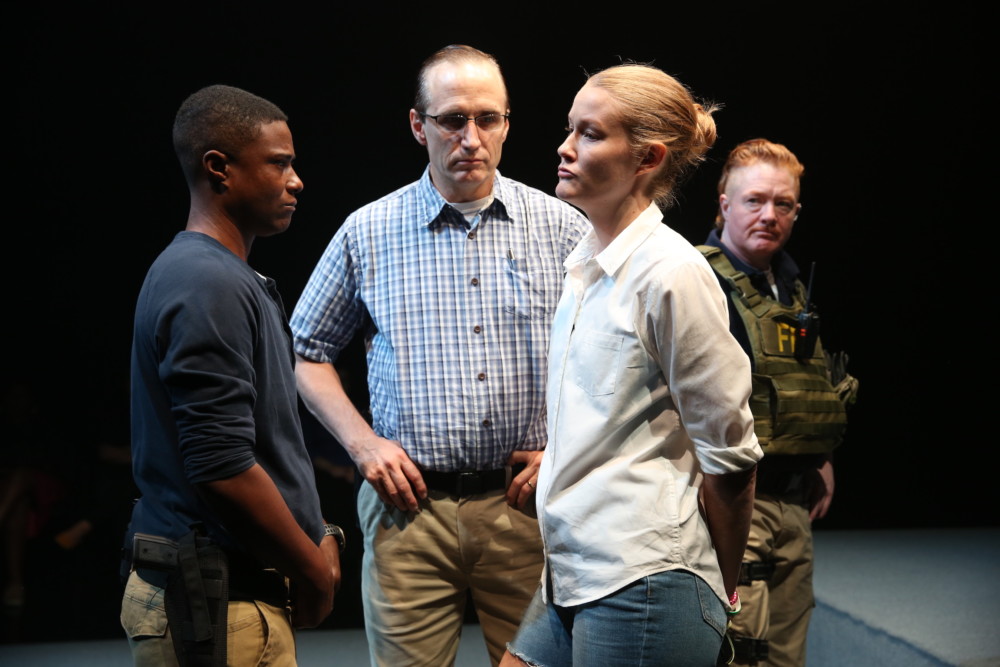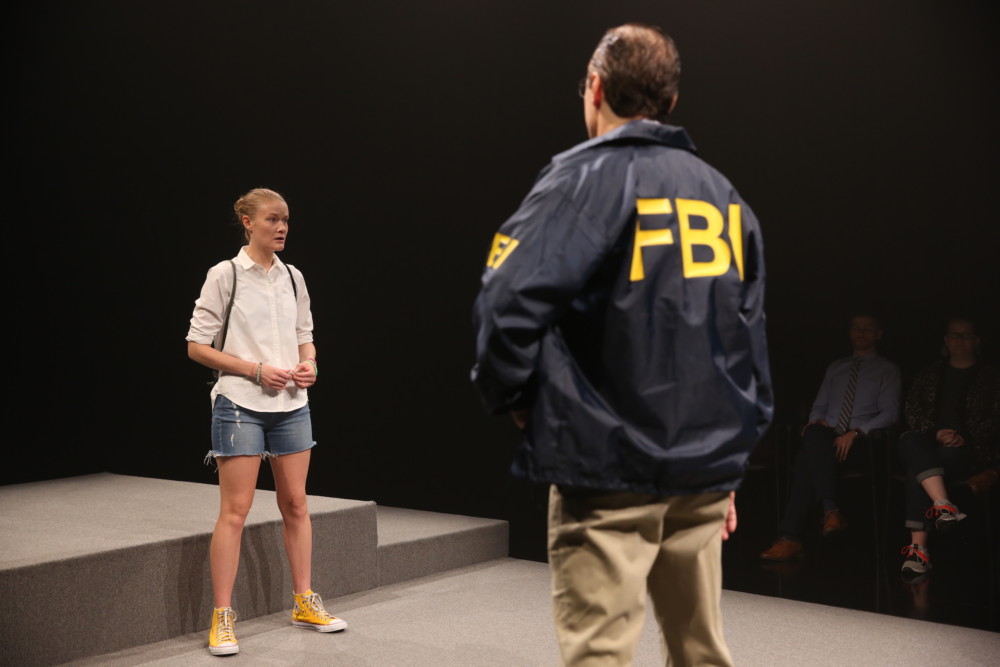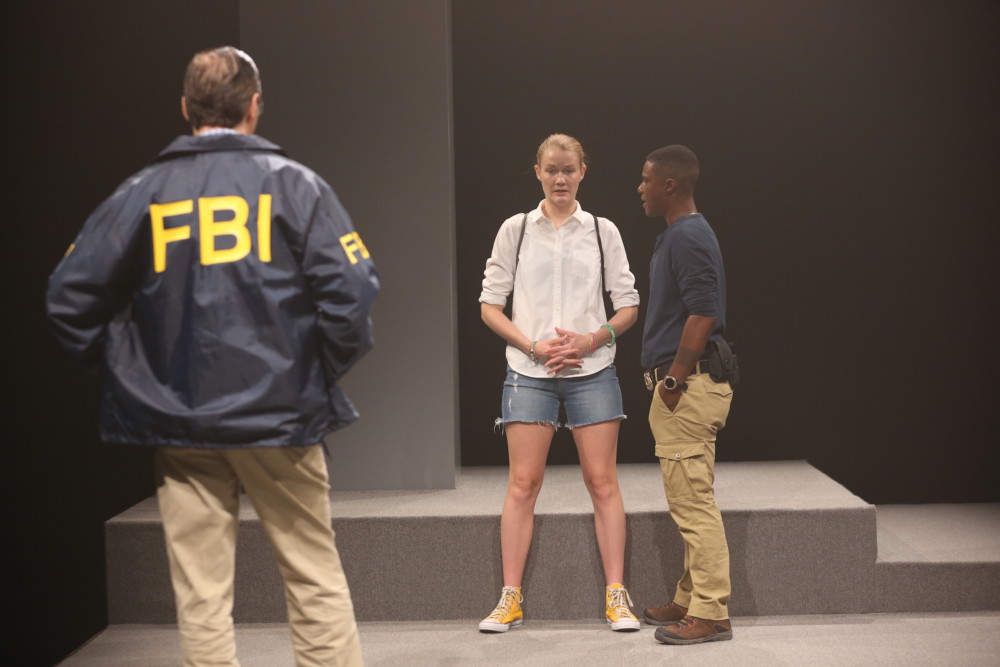
TL Thompson, Pete Simpson, Emily Davis, Becca Blackwell
REOPENS DEC. 20 THRU JAN. 19, 2020
By Samuel L. Leiter
Maybe you’ve heard the unusual name Reality Winner. Maybe you haven’t, or, if you have, can’t recall why. And, unless you make the absolutely necessary effort to learn who she is, what she did, and what happened to her afterward, you may not (even when it’s over) fully appreciate Is This A Room (capital “A” required by the producer), the intriguing, topically hot docudrama about her, conceived and directed by the talented Tina Satter, at the Vineyard Theatre.
For starters, read the Wikipedia article about her, or this Vineyard page. Briefly, she belongs to the mix of high-profile, controversial whistleblowers that includes Julian Assange, Edward Snowden, and Chelsea Manning, criticized for mishandling classified information by leaking it to the outside world—in this case The Intercept. Winner was an intelligence specialist working for a military contractor when she shared information concerning Russian interference in the 2016 presidential election.
Is This A Room stages the recorded, verbatim transcript—yes, word for word (as someone is likely one day to do of the Trump-Zelensky phone call)—of the visit to Winner’s house in Augusta, GA, by the FBI on June 3, 2017. There, she was interrogated by agents regarding her breach of security, for which she was incarcerated without bail and sentenced to 63 months in federal prison.


Becca Blackwell, TL Thompson, Pete Simpson
The 70-minute script presents the transcript and nothing but the transcript, offering not a word about Winner’s pre-arrest opinions (she once called President Trump “an orange fascist”), her jailing, her sentence, or even that Trump himself weighed in—supportively—on the severity (“so unfair”) of her record-breaking punishment.
What we get is a chilling picture of how two agents, Justin Garrick (Pete Simpson) and Wallace Taylor (TL Thompson), disarmingly sure-of-themselves, unexpectedly arrive—with backup—at Winner’s chairless house, and question her in a disused room (thus the title). Dressed in everyday wear (by Enver Chakartash), with holstered firearms at their sides, they’re a striking blend of ingratiating, even polite behavior jutting from a bedrock of craftily steely determination. Meanwhile, a burly agent (Becca Blackwell), in protective FBI vest and camo gear, prowls about, talking into his devices.
Perhaps a third of what transpires before any serious questions are asked is about pets (a puppet plays Winner’s dog), CrossFit training, the lack of chairs (forcing everyone to stand), Winner’s weapons (including a pink AR-15 and a Glock Nine), her military service and aspirations, her linguistic expertise (Farsi, Dari, and Pashtu), and so on.
Winner herself—played by the excellent Davis with fresh-faced candor and naivete balanced with edge-of-the-knife tension—comes off as a girl-next-door blonde from Alice, Texas. She also possesses not only distinctive language skills but physical ones, being a gym rat and yoga instructor. Only 26 when interviewed, she slowly realizes that these men already know all they need to know. They insist they simply want to give her an opening to fess up before she digs too deep a hole for herself. Which, as we cringe, she proceeds to do.
Satter stages this material on Parker Lutz’s bare, pale gray arrangement of a narrow platform with raised areas at either side, with a row of audience members seated upstage facing both us and the performers. This abstract environment allows her to choreograph and orchestrate the material to express each nuanced inflection through body placement, gestures, and tonal variations. Adding crucial heightening is Thomas Dunn’s exceptionally precise lighting modulations, Lee Kinne and Sanae Yamada’s multidimensional sound design, and Yamada’s original music.


Emily Davis, Pete Simpson
This is most notable when, to express in theatrical terms the redacted parts of the transcript, sound and lights conjoin to create a brief pause before the dialogue resumes. While the words and actions seem conversationally off-the-cuff, the production creates significant resonance by expressing a shifting undercurrent of menace beneath surface layers of benign behavior.
It’s important to remember that Satter doesn’t editorialize, regardless of whether you agree with the FBI’s assessment of criminal activity, think their handling of this situation was egregious, or consider her infraction secondary to what it uncovered. The play simply reminds us that Reality Winner broke the law, that she tried to cover it up, that you don’t mess with the FBI, and that she went to jail for her crime.
The audience’s job is to reflect on the ethical dilemma of whether breaking the law to reveal classified information—even information that favors one’s political perceptions—is appropriate, and even when the whistleblower is, to all intents and purposes, a decent young woman who saw no alternative but to do what she thought was her duty. It makes no judgments and assumes the audience will care enough to think more deeply on the distinction between patriots and traitors.
It’s up to each of us not only to fill in the blanks but to decide for ourselves if this exercise in theatrical reality sufficiently addresses the issue of whether Reality Winner is a winner or a loser. And without any contextual background—even a post-curtain projection crawl—I suspect few people will bother.
Is This A Room. Through November 10 at the Vineyard Theatre (108 East 15th Street, between Union Square East and Irving Place). 70 minutes, no intermission. www.vineyardtheatre.org
Photos: Carol Rosegg






















